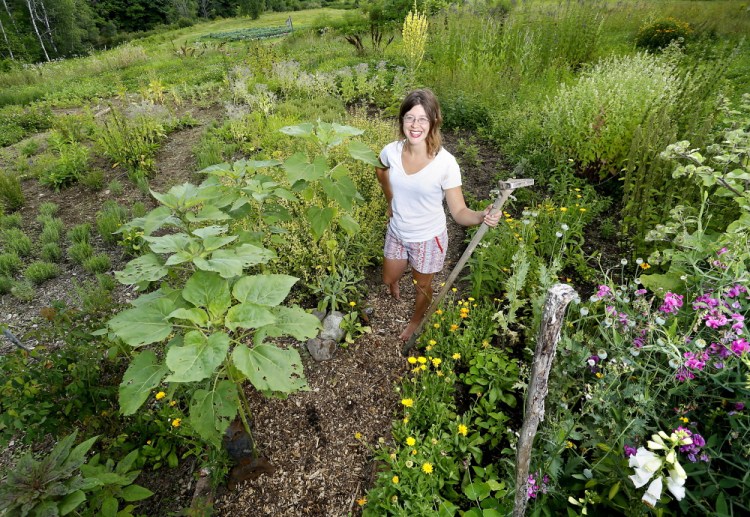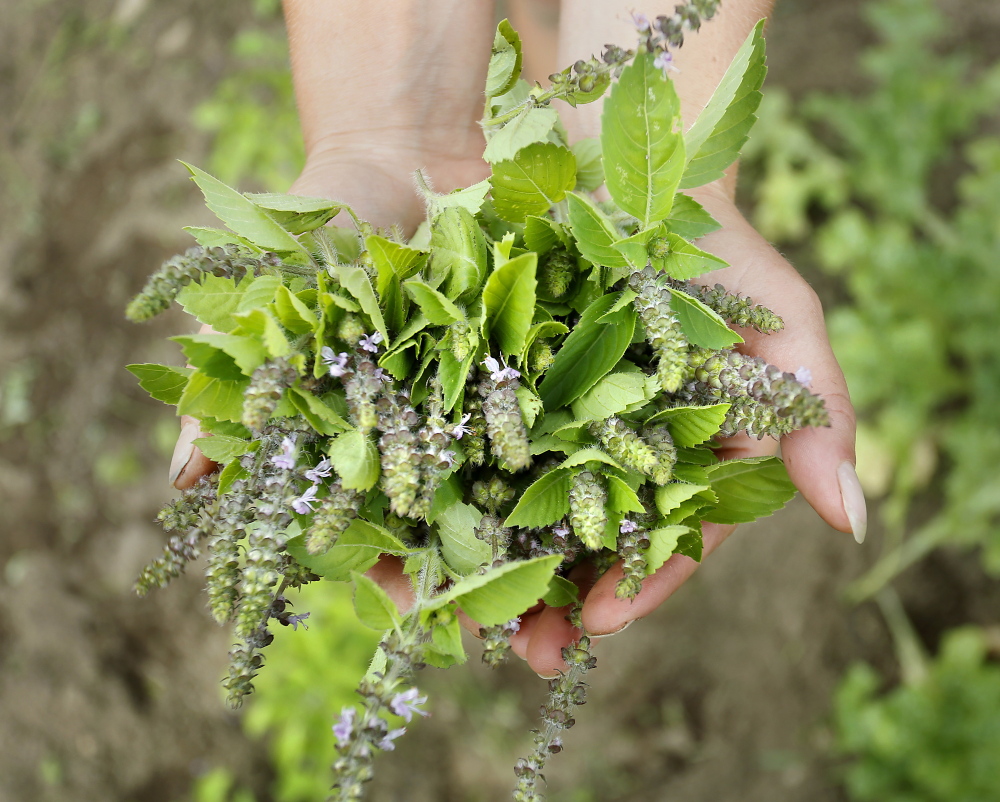When we found out Cassandra Sears was running an herbal CSA out of Winslow Farm, we wanted to know more. Just herbs? Who was she marketing to anyway, the mad pesto makers of Maine? We visited her at Winslow Farm, where she mingled with the bees and butterflies foraging in her herb garden and taught us that the leaves of artichoke plants can be used to make medicinal bitters. The next day she called from the road, on her weekly drive to Montpelier, where she’s studying at the Vermont Center for Integrative Herbalism. She set us straight on the CSA and so much else, including the nature of weeds.
SKIPPING GRADES: Sears, who grew up in York, entered the Vermont program with credit for the work she’s been doing already at Winslow Farm; they let her skip to the second year of the three-year program. She’ll bring those skills back to her native Maine when she’s done. “Herbal medicine is a different paradigm than we are used to,” she says. She’s studying to become a clinical herbalist, which will enable her to counsel people and see them in a clinic setting, to support their health.
HUH? SUPPORT THEIR HEALTH?: “You can’t use words like ‘treat,'” Sears explains. “You can’t use doctor words, basically. It is a legal breach,” she said. Herbalists don’t treat disease. “Basically the idea is that you are creating a healthy system and a healthy body and the illness is not able to thrive in that environment.”
HERB CURIOUS: Her mother tells her that, when she was a baby, she could stare at a blade of grass for hours. “I have always loved plants, but I got into it more seriously when I started investigating what I want to do to live a more meaningful life that was connected with the world.” Gardens weren’t a prominent thing in her childhood, but her alternative high school in Kennebunk, The New School, offered her a chance to garden. And introduced her to a mentor, principal Marilyn Wentworth, who has a homestead. “I really feel like I came to it from a very conceptual place of truth-seeking.”
FARMING WAS THE GATEWAY: Her first farm apprenticeship was at Darthia Farm in Gouldsboro. “I found myself drawn to the weeds I was pulling out,” she said. The dandelion, purslane, sick weed, lambs quarters – all of them intrigued her. “There are documents out there that compare the nutritional value of common greens with wild greens,” Sears says. “And, pretty much, wild greens are a ton more nutritious.” Her interest in herbs grew as she continued along with a course of study that included permaculture classes and, last year, becoming a Journeyperson through the Maine Organic Farmers and Gardeners Association with her partner, Max Boudreau.
IN DEFENSE OF WEEDS: “The definition of a weed is anything that you don’t want to be there,” Sears says. Which is very subjective. Wild sorrel for instance. It spreads like the dickens, but when you’re pulling it up, why not make a lemony pesto for fish with it?
CHEF DU HERB? “I just play in the kitchen,” she says. “Like I never follow recipes. Over time, I have become better with food because I’ve made a lot of mistakes and made things that don’t taste so great.”
SIDE JOB: Like so many young farmers, Sears has been working off the farm as well. Her gig has been house cleaning. “That’s what I have been doing for four or five years,” she said. “But I am trying to get out of it.”
STUCK IN THE LUNGS: Sears uses herbs to support her own health – remember, don’t say “treat” – in interesting ways. A mullein infusion helps when she feels like she’s got something going on in her lungs. She might even smoke the mullein if it feels like there is something stuck in there. “Smoking it helps loosen that,” she says. “I think that is pretty controversial, but also making a really strong tea would help as well.” She’s worried that she sounds like she’s advocating for smoking and wants to be clear, it works for her, but “it is not for everyone.”
SO WHAT DOES COME IN THAT CSA? A lot more than just basil and parsley, although that too. “There is a point system,” she says. Participants get a list to choose from and nine points per month. The fresh herbs might be worth one point, whereas a 2-ounce infused medicinal oil might be three points. It costs $140 and gets you a monthly delivery from June through September. Sears shares the CSA duties with Katie Munn at Winslow Farm and Carol Power, a neighbor. They have 12 participants and hope to expand it in the future.
TEACHER TEACHER: They’re also giving classes. On Aug. 17, they’re teaching tincture making, and on Sept. 28 an intro to Materia Medica. Classes cost $35 and start at 1 p.m. at Winslow Farm, 291 Gray Road, West Falmouth. See the Little Bear Apothecary Facebook page for more information, or write to Sears at Littlebear apothecary@gmail.com.
Send questions/comments to the editors.





Success. Please wait for the page to reload. If the page does not reload within 5 seconds, please refresh the page.
Enter your email and password to access comments.
Hi, to comment on stories you must . This profile is in addition to your subscription and website login.
Already have a commenting profile? .
Invalid username/password.
Please check your email to confirm and complete your registration.
Only subscribers are eligible to post comments. Please subscribe or login first for digital access. Here’s why.
Use the form below to reset your password. When you've submitted your account email, we will send an email with a reset code.